
In our 2022 BizPulse Canada study delivered in collaboration with Maru Group, we explored an ever-evolving set of issues impacting the operations and success of Canadian businesses and how they are integrating AI into their business.
Highlights
The adoption of AI among Canadian businesses is growing: One-half (54%) of Canadian companies use AI, up from 47% pre-pandemic. Those who do, do so for more than three different reasons per company, with data collection and analysis as most common, followed by fraud detection, CRM analysis, improving sales and marketing decisions, and helping with bookkeeping/accounting.
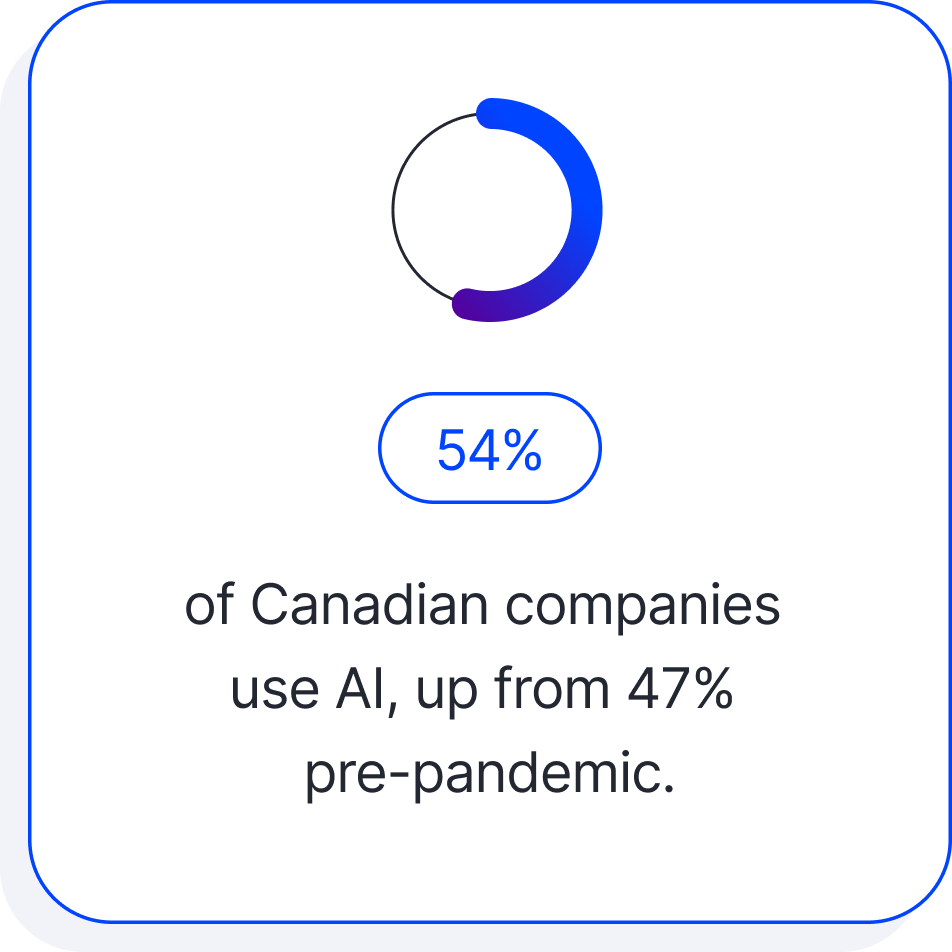
RBC Borealis & Maru Report: Canadian businesses’ use of AI 2022
Many business leaders see AI as a requirement for business in the future, however, they view it as mostly for larger organizations. Just over one-half of AI users say AI is central to our growth, while companies see a variety of benefits, including serving clients better and reducing the need for staff.
Canadian businesses demonstrate awareness of AI impact on their business, benefits, and risks, but business leaders feel under-prepared to deal with the ethical challenges that AI represents.
How committed are Canadian businesses to adopting AI ethically and responsibly?
Businesses agree ethical implementation of AI is important. However, just one-in-five mention ethical concerns as a critical risk to their AI efforts. Most business owners prioritized other concerns related to AI risks, namely: privacy, cybersecurity, and regulation. 29% of business owners worry about explainability.
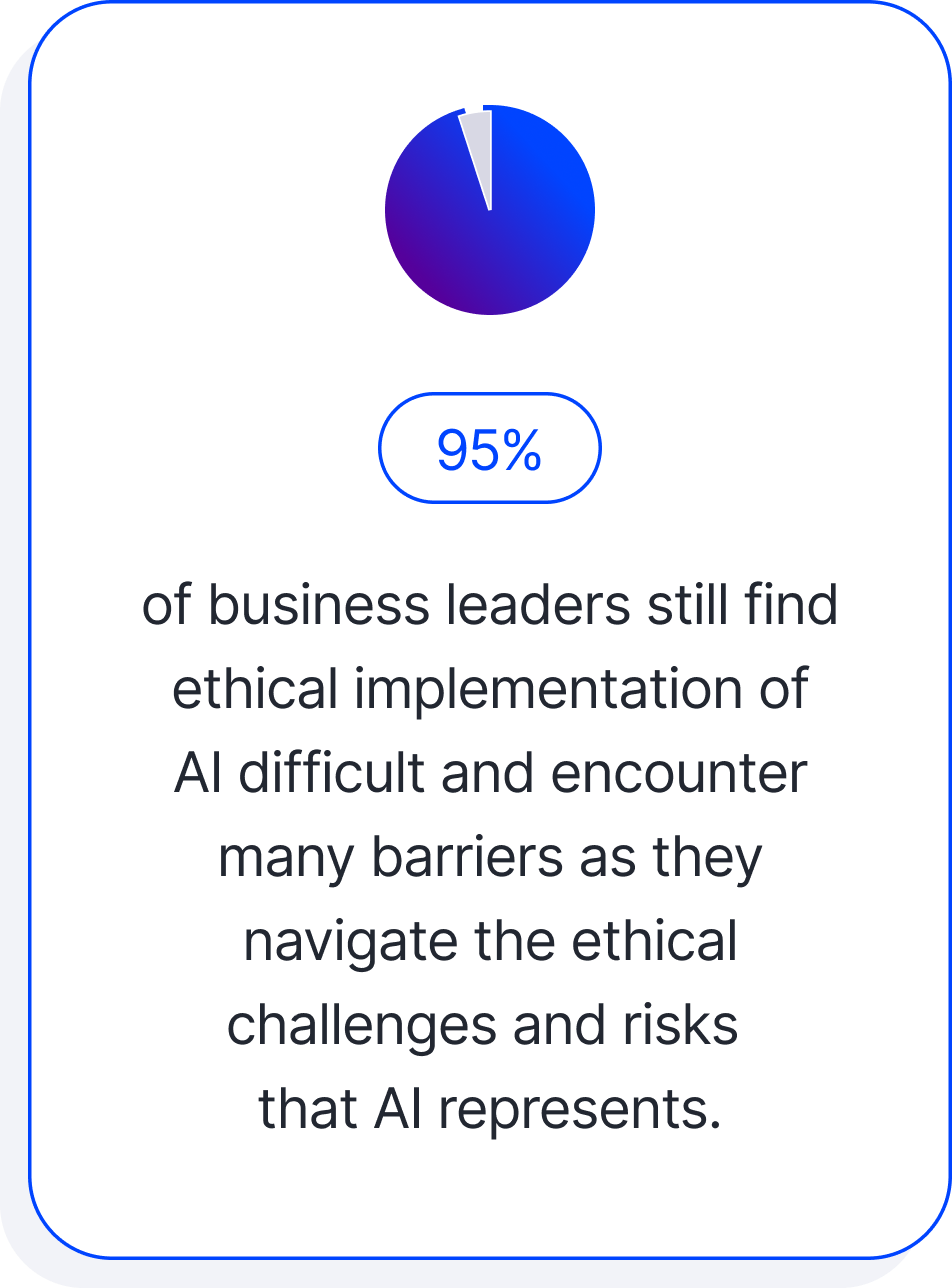
RBC Borealis & Maru Report: Canadian businesses’ use of AI 2022
The findings show that a vast majority business leaders (95%) still find ethical implementation of AI difficult and encounter many barriers as they navigate the ethical challenges and risks that AI represents.
Businesses agree ethical implementation of AI is important. However, just one-in-five mention ethical concerns as a critical risk to their AI efforts. Most business owners prioritized other concerns related to AI risks, namely: privacy, cybersecurity, and regulation. 29% of business owners worry about explainability.
Fewer than one-in-five AI users have ever retracted a model. Just one-third say they have dedicated IT support to lead their AI; the rest rely on senior management or business partners.
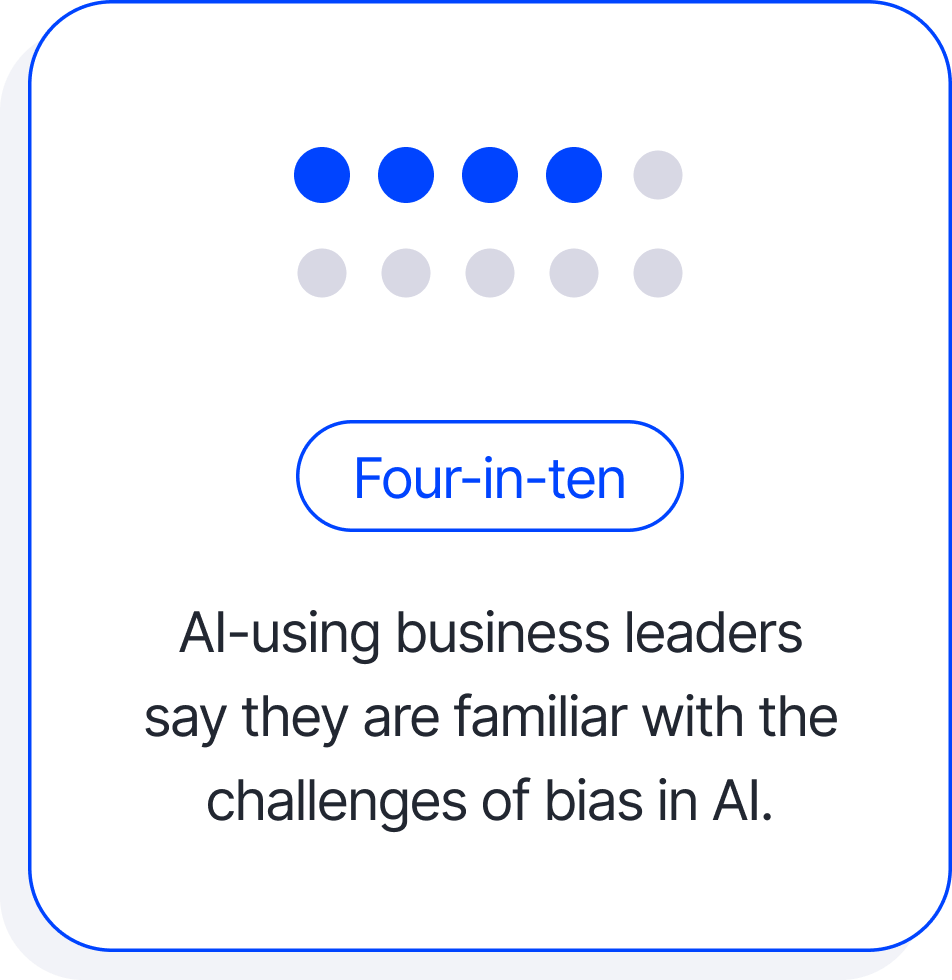
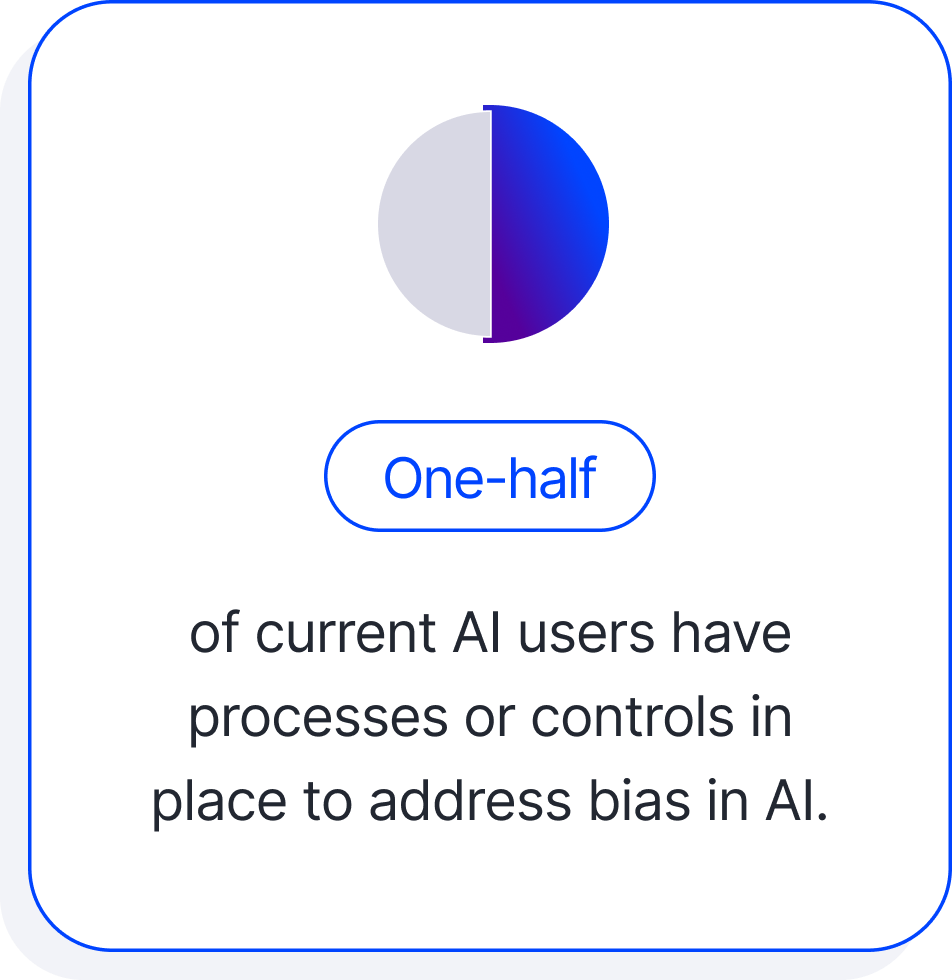
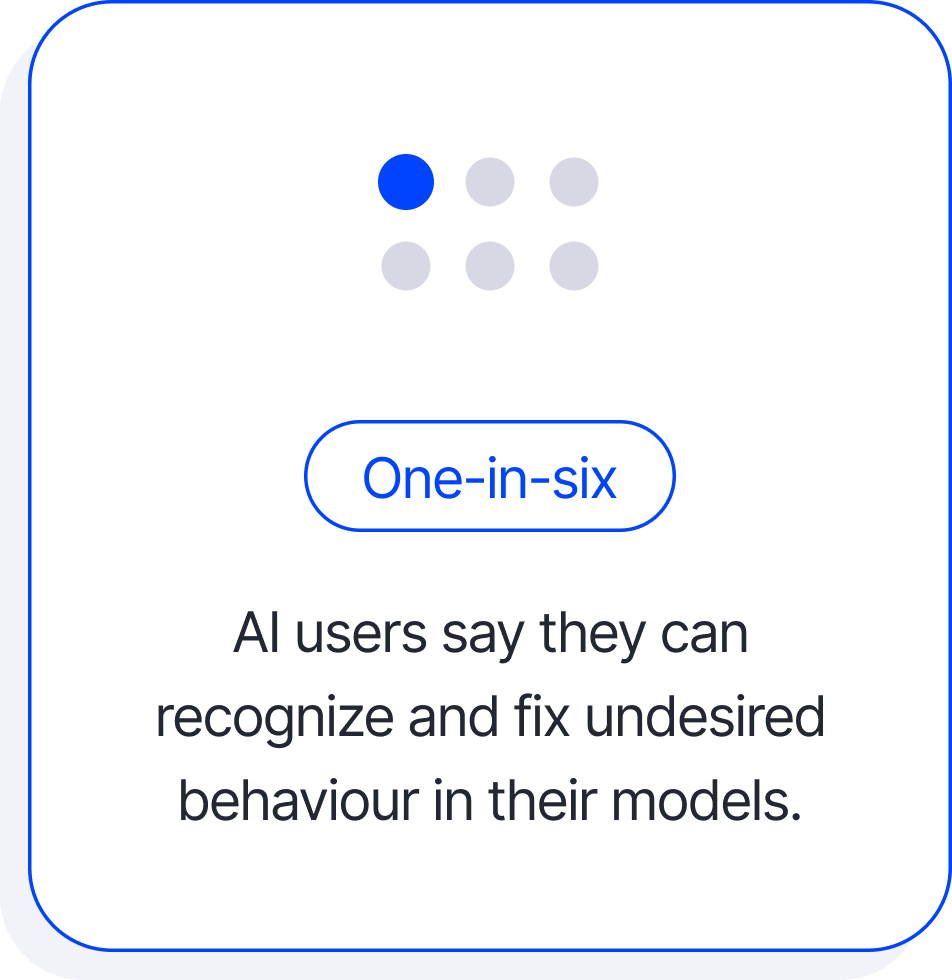
RBC Borealis & Maru Report: Canadian businesses’ use of AI 2022
More report highlights on bias in AI, model remediation, and barriers to responsible AI implementation
Just four-in-ten AI-using business leaders say they are familiar with the challenges of bias in AI.
One-half of current AI users have processes or controls in place to address bias in AI.
Just one-in-six AI users say they can recognize and fix undesired behaviour in their models.
Just over one-half of AI users have a defined ethics officer. Businesses handle AI ethics in a variety of ways; the IT team is most commonly responsible, followed by CIO, CEO, business owner, and external vendor.
On average, businesses implementing AI identify 2 different barriers to ethical and responsible implementation. Top barriers named included: Cost and lack of understanding of how to make AI responsible. Others cite a lack of available talent/resources and a lack of understanding of what responsible AI means. Finally, some see ethical and responsible AI implementation as risky, not a high priority, and not directly tied to the business value.
Just 5% of companies indicated they do not experience barriers to implementing AI ethically and responsibly.
Businesses agree ethical implementation of AI is important.
The good news is that businesses agree ethical implementation of AI is important. Most AI users acknowledge the need for fair and ethical application, with strong agreement on the importance of:
• Implementing AI in a way that treats people ethically and fairly
• Testing and validation of AI algorithms before deployment to avoid bias in the algorithms
• Continually monitoring of AI models’ performance
• Implementing AI in an ethical way, no matter the line of business or size of the organization
• Being able to understand and explain the results of AI models
• Having AI model governance in place, so any issues found can be escalated and dealt with efficiently
Staying in control of AI-based technology and systems can be an important factor to ensure trust. 🤝
Business owners care about security and trust.
Defined as deviation from anticipated performance that may indicate important issues to require attention, security is seen as one of the biggest reasons for implementing AI in an ethical and responsible way. There’s also a shared understanding that trust can erode when an ML system performs in an unpredictable way that is difficult to understand.
In numbers: More than three-quarters of business owners surveyed say explainability of AI models is important; One-third of businesses say explainability is vital, with 16% more saying it will be important in the future.
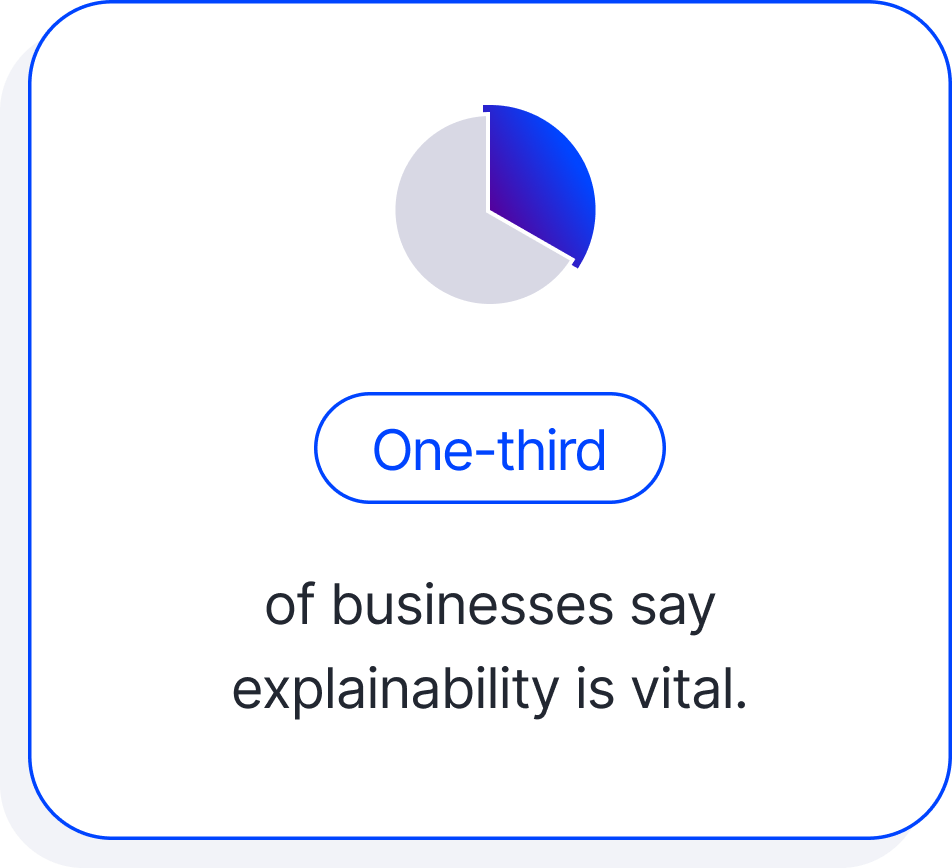
RBC Borealis & Maru Report: Canadian businesses’ use of AI 2022
Ensuring trust in AI models means assessing the impact on human interaction, guarding against mistakes made by AI, and risks related to AI amplifying systemic bias, such as racism and gender bias, and contributing to inequality, and other unintended consequences, such as unemployment or identity fraud.
Businesses also invest in robustness of their AI systems; model governance; remediation; and monitoring.
Conclusion: As more businesses adopt AI and begin to transform their decision-making systems, responsible AI emerges as a business necessity.
In the AI adoption journey from niche solutions to large-scale transformation, Canadian businesses stand to benefit from fundamental advances in AI, especially in the fields of Computer Vision and Natural Language.
In today’s environment, when AI advances like GPT-3 dominate headlines, many companies will increasingly look to AI to deliver predictions at scale. As more businesses integrate AI deeper into the organizational decision-making systems, stronger awareness of AI ethics is needed to adopt these technologies ethically and responsibly.
The awareness of AI ethics must be coupled with the practical implementation of AI ethics principles and statements — a complex yet necessary challenge Canadian businesses should be prepared to navigate.
To support the advancement of responsible AI, RBC Borealis has launched RESPECT AI platform to bring together academic research, technical tutorials, and open-source and industry perspectives, helping to enable secure, fair, ethical and trusted AI products and more responsible adoption of AI technology across industries. Learn more about the main pillars of responsible AI on our Respect AI: Advancing responsible AI adoption page.
Further reading
& recommended sources
View All
-
fAux: Testing Individual Fairness via Gradient Alignment
fAux: Testing Individual Fairness via Gradient Alignment
G. Castiglione.
-
Not Too Close and Not Too Far Enforcing Monotonicity Requires Penalizing The Right Points
Not Too Close and Not Too Far Enforcing Monotonicity Requires Penalizing The Right Points
J. Monteiro, M. O. Ahmed, H. Hajimirsadeghi, and G. Mori. NeurIPS Workshop on eXplainable AI Approaches for Debugging and Diagnosis, 2021
News